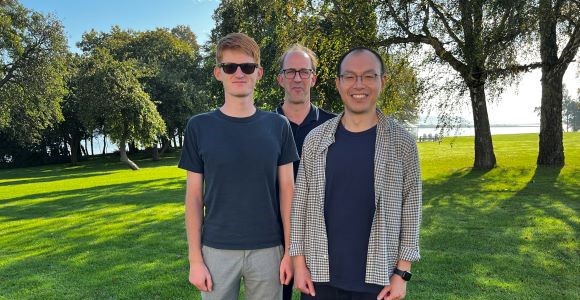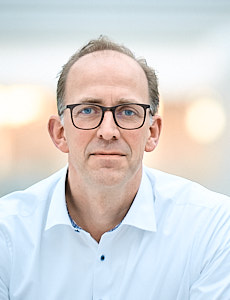
Graduated from SDU - PhD student in Korea
Why do a PhD study in Asia? Read about why Jacob Terndrup Heiden made the decision
PhD student Jacob Terndrup Heiden has visited POLIMA for the three weeks in August and September. Jacob Terndrup Heiden has collaborated in the laboratories with SDU researchers Martin Koch Nørgaard, Christian Frydendahl and Vladimir A. Zenin. Jacob Terndrup Heiden is originally from Odense and did his bachelor studies at University of Southern Denmark (SDU), but why did he end up doing his PhD study in Korea? And how is this also beneficial to SDU? Please meet Jacob Terndrup Heiden:
What is your educational background?
I have been living in Odense almost all my life with, a short stint in Belgium when I was a kid. I pursued my bachelor’s degree in physics and technology here at University of Southern Denmark. Afterwards, I went to KAIST in Daejeon Korea to study for my master's and continued doing a PhD at KAIST in JLAB - the research group led by Professor Min Seok Jang.
What is your field of research?
In my current research, I am investigating the behavior of light confined in low-dimensional materials such as hexagonal boron nitride, and exploring what happens when we take this confinement to the extreme by shrinking the size of our structure."
Why did you choose to do your master in Korea?
When I was a kid, we lived in Belgium for a few years, and I guess there's a little bit of adventurousness in my DNA and for a long time I've been fascinated by East Asia probably from watching way too many Japanese, Hong Kong, and Korean movies. Studying in Korea was a good opportunity to try something new and experience a different culture.
Korea Advanced Institute of Science and Technology (KAIST) offers a program for foreign students, primarily it appears to attract students from other parts of Asia, but they are quite interested in students who apply from the US and Europe to get some different cultural perspectives at the university.
I started my PhD in 2020. So, I've been doing it for three years now. The normal duration of a PhD is 4 years in Korea, but it seems flexible. I get a minor salary and together with a scholarship, I can make a living of it.
What has been the benefit of studying in Asia?
Trying something new! I believe it will open some doors, but most importantly it opens your mind to different ways of doing things. I think there's this stereotype about, especially Koreans, that they are working very hard, and it is to some extent true and to some extent, it is not true. Korean people are for sure spending a lot of time working and the students are studying quite hard. But at the same time, at least in my group JLAB, the atmosphere is quite relaxed. We don't have to spend 12 hours every day including weekends to work. We can have spare time and there's for example a guy in my laboratory who does professional triathlon on the side. So, you have time to do other things. But at the same time, I have still learned that in Asia, they do work more and they're just more in the laboratory, whereas at least when I was a bachelor student in Denmark, we were sometimes very relaxed. To me personally, it has been beneficial to get this slightly different mindset of working a bit harder.
Could you please describe a day in Jacob’s life as PhD student in Korea?
I've always been an early bird, so I'm usually at the office between 7:30 and 8:00 and in Korea, the normal work hour usually starts at 9. So usually, I'm there alone for a couple of hours, which is nice, I can get some things done in peace and quiet. So, I'll read and do the bureaucratic things I need to do and then once people start coming in, I'll go to the laboratory and have a cup of coffee with people. Around 5:30/6:00-ish, I head home. In the evening, I cook dinner with my girlfriend and just relax or might cycle for an hour or two. That's my typical day.
You have been visiting POLIMA for the last three weeks, how do you benefit from this visit?
The visit is funded by a grant program called Korea-Nordic R&D Network Program that KAIST received, partnering with POLIMA. Last year, three persons from KAIST visited POLIMA and this year I am the sole visitor. The plan was originally to use the visit to discuss some theory for my research as we had some very interesting results, but just before I left Korea, we figured out that these interesting results probably stemmed from an unwanted interfacial layer forming during the sample fabrication. So while I've been here, we've been trying to remove this layer. But this is how research is, we went from thinking we were doing one thing to doing something very different.
The visit has been very productive for me, and I hope this is also the case for the POLIMA team. And then on a personal note, the visit to Odense allows me to visit my family. They live here, so I can stay with my family and that is very nice.
What do you think is the greatest benefit of going to an Asian country to study?
First, I think you learn a different way of working and I have learned to work a little bit more independently than I did in Denmark. And you learn that it is expected that you work very hard and spend the necessary hours to study. I think that's quite valuable to learn and it is also applicable to your personal life: If your sink is ruined, you must fix it, right? And you can't just go to bed.
Second, would be to experience a radically different culture. You experience things differently when you live in a place than when you just travel. When you travel somewhere as a tourist you don't interact deeply with people, but when you live in another country, you learn how different we are all around the world, but also how similar we are. Even though Koreans and Danes live on the almost opposite side of the globe, we are still very similar in many ways.

Funding
Professor N. Asger Mortensen, POLIMA:
Why is research mobility important?
Research is international! It is important for both students and emerging researchers to also probe science and research beyond the borders of Denmark and to be exposed to other learning and research environments. Denmark and Korea are governed by the same physical laws, but it's always presented in new ways maybe in the context of exciting new technology needed locally. And being part of other research environment also gives a better understanding for culture and diversities. In future work life, you will most often be exposed to number of different conflicts coming from different environments and being out there you learn to navigate in that.
POLIMA and SDU has the ambition of being an international educational institution and doing research at the highest international level and we will only succeed with this ambition if we interact with the international world. Sending our best students to the best international environments is of course to the benefit of those receiving environments, but it's also tremendous beneficial for Denmark and SDU, because we suddenly have a skilled person that is also able to navigate in other countries. I think we just get better candidates out at the other end if they are exposed to more diverse educational and research environments.
We shouldn't fear letting good talent leave for other environments. We shouldn't hold on to talented students or researchers, rather we should give them even more opportunities to develop, and maybe someday they might even return to Denmark as better persons, better scientists, better engineers.
